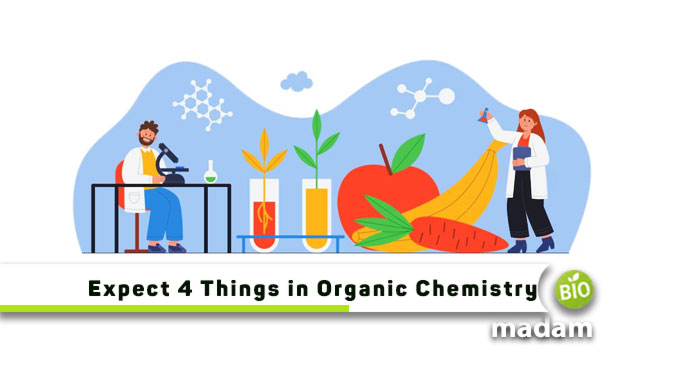Recently updated on September 11th, 2023 at 11:45 am
Chemistry, as a subject, calls to mind countless compounds, their molecular structures, and chemical reactions – in all their complexities. As one would expect, it’s perceived as one of the most challenging subjects one has to learn in school.
Quite understandably, organic chemistry, its subdiscipline that deals with organic matter, is just as complex a subject and can be easily overwhelming for students. So, if someone says organic chem is easier than you think, it’s often hard to believe, and you’ll probably wonder how such a technical subject can get easier over time.
But if you’re eager to learn and are up for the challenge, organic chemistry can be a fascinating subject that rewards the most curious of minds. Now, to begin dissecting this complex subject, it will pay to understand what to expect so you can prepare before you dive right in.
What is Organic Chemistry?
Simply put, it’s the branch of chemistry that deals with studying carbon compounds. These compounds are the building blocks of life and are found in everything from food to medicines. Although carbon and hydrogen are the most common elements in organic compounds, oxygen, halogens, nitrogen, phosphorus, silicon, and sulfur may also be present.

As a subject, it will require learners to understand the structure, reactions, properties, composition, and preparation of compounds that contain carbon and how they can be synthesized and used in various new applications.
To avoid getting overwhelmed as a learner, here are the top three things you can expect and prepare for before taking on this subject:
Learn the Basics of the Structure and Properties of Organic Compounds
The structure and properties of organic molecules – their components and characteristics – is a central concept in organic chemistry, and it’s one of the first topics you’ll study.
Here you’ll learn the various kinds of hydrocarbons, functional groups, isomers, bond angles, and hybridization. Atomic configuration and chemical bonds are included in this too, and how they affect a compound’s properties.
Learning the basics of an organic compound’s structural makeup and properties is the foundation for understanding its behavior and, consequently, its reactivity. The same goes for creating new compounds with specific properties.
Activities in this lesson typically include naming and drawing molecules using skeletal structure or bond-line notation and developing and rewriting molecules for each mechanism stage.
Understand the Differences and Connections between Organic Chemistry and Other Sciences
General chemistry connects mathematics and physics, biology and medicine, earth and environmental sciences, and biochemistry and astronomy. But in contrast with other sciences, organic chemistry has the following key differences:
- Focus on carbon compounds – As opposed to other sciences, such as physics or biology, organic chemistry focuses on carbon compounds.
- Synthesis and reactions – Another important aspect of organic chemistry is the synthesis of new compounds and the reactions between them. Other sciences, such as physics or biology, may have a narrower focus on synthesis and reactions. You’ll learn about the reactions between organic compounds, including substitution, elimination, addition, and oxidation-reduction reactions. You’ll also learn about the different methods of synthesizing new compounds and how to control the outcome of a reaction.
- Molecular structure – The molecular structure of compounds is emphasized heavily in organic chemistry, whereas other sciences may place a greater emphasis on their macroscopic properties.
- Interdisciplinary nature – There’s a lot of overlap between organic chemistry and other sciences, such as biology, medicine, and materials science. While organic chemists work on projects covering multiple disciplines, other scientists may have a narrower focus.
- Theoretical and applied studies – The study of organic chemistry includes both the understanding of the underlying principles as well as practical applications of those principles. Other sciences may emphasize the subject’s theoretical or applied aspects.
- Laboratory work – Most of the work in organic chemistry is carried out in laboratories through experiments and synthesis. Physics and astronomy, for example, may rely more on theoretical models and simulations.
If you’ve taken other science subjects before, understanding how they differ at a certain level will help you know what to expect and what not to expect.
Explore Mechanisms and Reactions
An organic compound’s unique structure and properties are the biggest factors that determine how it’ll react to other carbon compounds. Once you’re knowledgeable about these basics, it’ll be easier to handle the hundreds of chemical reactions you’ll have to be familiar with in just one course.

To understand carbon compound mechanisms, you must learn to analyze how acid/base reactions occur, which bonds break, and which new bonds are created. You also need to pay attention to how molecules attack each other during a reaction process. In this area, it will help to observe patterns and similarities because, unlike other sciences, memorization will not be as helpful in chemistry since there are several exceptions to every rule.
Discover how Organic Compounds Exist in Reality
The world around us is full of organic compounds. A better knowledge of organic chemistry will help you understand the compounds that make up the things you see and use daily, particularly how the most common biological phenomena occur.
Despite organic compounds’ complex structures, reactivity, and properties, you can observe patterns in organic chemistry. By understanding these patterns, you can predict the behavior of a compound and put together new compounds.
Final Thoughts
Generally speaking, organic chemistry, as a branch of chemistry, may be complex but, it doesn’t have to be intimidating. By starting with the basics, you’ll find that organic chem is easier than you think. Use tools like model kits and computer simulations to better visualize the structure and reactivity of compounds better.
When you approach organic chemistry with the positive mindset of a curious learner, you’ll discover the beauty and simplicity in its complexity.

Hi, they call me Jenna, and I am also known for achieving a gold medal during my Ph.D. in science life. I always had a dream to educate people through my utmost writing hobby. So, I chose this blogging path, and Biomadam gave me this opportunity to present for them. I now stand to entertain you. Continue reading my articles & discuss if you’ve any confusion through the comment section below.

